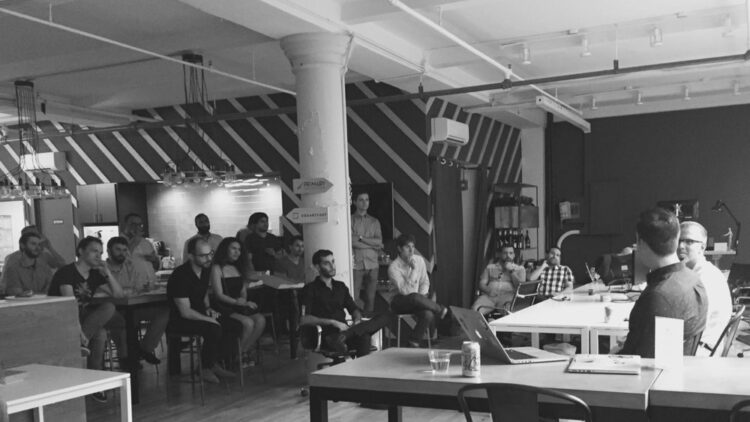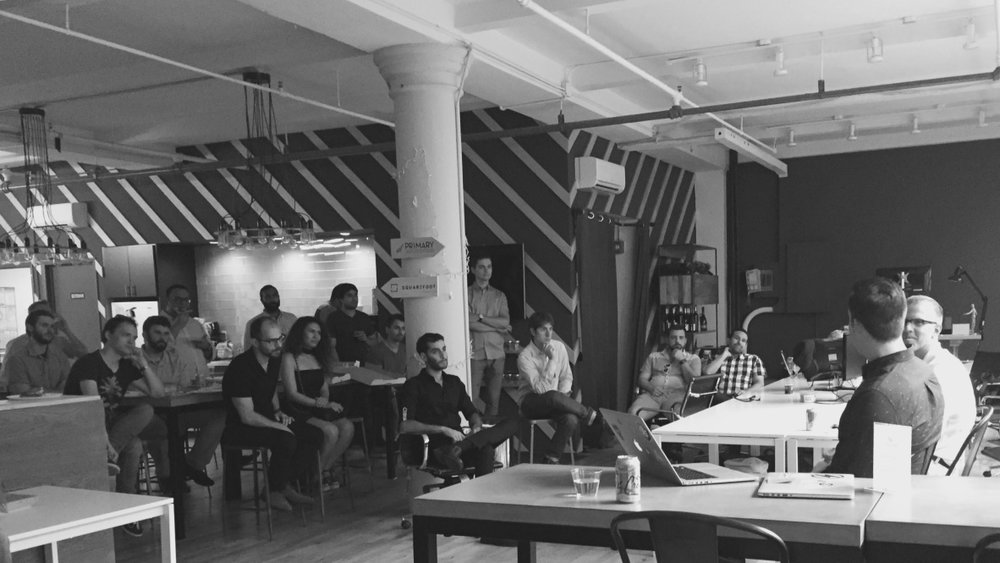One of the most unfortunate realities of the startup world is the wide gulf that exists between the business and technical sides of most early-stage companies and the startup community at large. Born, like so many things, out of discomfort with the unknown and exacerbated by the different languages these two groups speak, it’s a reality that is quite pervasive in our community, and seems to materially limit many in the engineering community from taking the plunge and becoming founders. This is a fact that is genuinely holding back the whole of NYC Tech. In an effort to demystify the financial side of the business, and with the overarching goal of encouraging entrepreneurially minded engineers to come forward with their ideas, we at Primary are working to foster an open dialogue and empower more would-be/should-be technical founders to step forward.
The first of these dialogues took place in our office last week, with a Q&A session between myself and 25 of the city’s leading principal engineers. These engineers are part of the Primary100, a community of leading principal and senior engineers that we – led by Brian Williams from our Talent Team – have been focused on building over the past year. The goals of the Primary100 are to create unique networking opportunities among this group and to encourage entrepreneurial engineers to come forward with their ideas and build great businesses.
Last week’s event was a great first step. I fielded many questions about our investment process, what we look for in our founders, navigating complicated co-founder relationships, and more. But what really stood out to me was the degree to which this group of high-powered engineers felt an impossible divide between themselves and the investment community. There was a pervasive sense that, without the seemingly inborn networks of the McKinsey and HBS-bred business-side leadership, one couldn’t even get a first meeting with a VC.
This feeling of inaccessibility is truly a shame! I met some awesome engineers last week who have fantastic ideas, many of which are lying dormant behind this perceived impenetrable barrier. To those engineers with ideas waiting to be surfaced, I offer this one piece of advice: Stop thinking of the venture business in terms of businesspeople vs. engineers. Getting funding isn’t about having that magic network from Day 1. It’s about having a magical vision for a business, and then exercising an exceptional level of hustle and dedication to make the connections necessary to sell people on that vision.
At last week’s event, when asked what makes for a great technical founder, I hesitated a bit in answering, because we look for the same qualities in all of our founders, regardless of which corner of the universe they come from. We’re looking for a track record of excellence, for individuals who’ve built great stuff and solved hard problems, and for those we believe have a certain Pied Piper-style ability to get legions of people to do the unnatural act of following them. Anyone who plans to lead a startup – be s/he a techie or an MBA – will have to successfully sell three key constituencies: prospective team members, prospective financing partners, and prospective customers. So to any would-be engineering founder who suggests that only HBS grads get a hard look from VCs, I respond with this: I love backing engineering-driven founders, but you can’t build a business without selling. Regardless of your own personal network coming out of the gate, you need to display the resourcefulness and tenacity to get that first meeting. If you’re unable to find a path to an investor, how am I to believe that you have the wherewithal to attract great talent or convince those first customers to take the plunge? No founder gets a pass on that fundamental challenge.
I’ve had the privilege of backing a number of fantastic engineer-founded companies, including TxVia (acquired by Google for $220MM in 2012), Apprenda, Divide (acquired by Google for $120MM in 2014), and Handshake. What was the common thread among all of these successful technical founders? First, they all had extraordinary market sensibility that led them to build great products aimed at big markets. They focused on market opportunity first, not on tech for tech’s sake. But more importantly, they got themselves out of the office and into the field from very early on, in essence transforming themselves from engineering founders into product founders – a shift that is absolutely essential for technical founder success. They were hungry to connect with their end users in a very tangible way, taking the risk of deploying minimum viable products and getting real feedback directly from their customers. This very hands-on cycle of creating product, engaging with customers, learning more about their market, and iterating accordingly, meant that they weren’t just sitting behind the curtain, perfecting and polishing from a distance. Rather, they were laser focused on building standout products that solved very real problems for a broad audience, all of which they confirmed through their own work in the field. This focus was the key, and what we hope to encourage more of amongst our community’s strongest technical talent.
By fostering an open dialogue between the VC world and engineers, we’re hoping to inspire the next generation of entrepreneurial engineers to come forward with their ideas, and to do so having thought effectively about customer and market needs. And we’re here to help with the process! Through our deep network of leading operators and entrepreneurs in the city, we can help founders develop technical ideas into formidable business solutions and build a team. We can help place engineers in leadership roles at existing companies, or team up aspiring tech founders with business-oriented leaders in our network. We’re looking to foster a culture in NYC where our best engineers are thinking disruptively about the types of technologies that are becoming increasingly appealing to investors. We’ve done all of this before, and we’re looking for more opportunities to bring engineering leaders to the front lines of the city’s preeminent startups.
But this is not a one-way street. As I told our roomful of engineers last week, we can be, and we have the desire to be, very actively supportive of our founders. However, we want to back the founders who don’t really need our help, and then find ways to help them excel. So when you show up to your first meeting with us, regardless of which side of the aisle you’ve come from, or how hard you’ve fought to get there, we want to see that you have the drive, thoughtfulness, and salesmanship to push your idea to the next level. The perceived wall between the two sides of the business is certainly not impenetrable, but it can only be broken down by those with the resourcefulness, sheer will, and focus to scale it.




